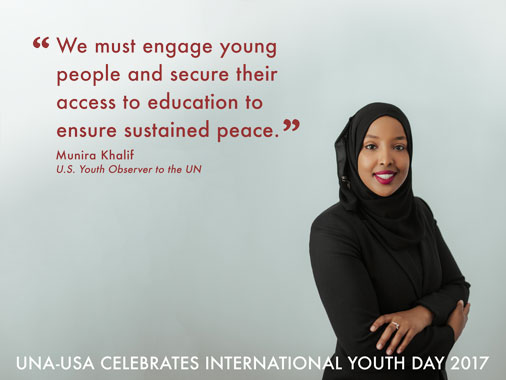International Youth Day: ‘We are the changemakers we have been waiting for’
As the largest youth population in history, there is power in our numbers, our raised voices, and our collective push towards change.
This International Youth Day, we celebrate the key role that young people play in promoting international peace and security. But we must also call attention to the upsetting truth that the potential of many of our peers is often hindered by conflict, violence, or instability.
While there are a record-breaking 1.8 billion young people worldwide, an estimated 600 million youth live in areas troubled with conflict. We are the largest generation of young people in history. In order for progress to be made, it will require young people to take action now.
Conflict has an outsized impact on youth. Young people are highly vulnerable to the immediate effects of conflict, and they inherit the long-term consequences of it as well.
For example, armed conflict poses as a huge barrier to education, depriving many young people the abundance of opportunities accompanied by a quality education. Sadly, only 79 percent of young people are literate in poor countries afflicted by conflict, whereas 93 percent of young people are literate in other poor countries. Matters are worse for young refugees. Only half of refugee children attend primary school, compared to the global average of 91 percent. And while 34 percent of young people worldwide enroll in university, only one percent of refugees make it to that level of education.
It is imperative that young people play a significant role in creating peaceful and inclusive societies. In recognizing this, the UN Security Council unanimously adopted resolution 2250 on Youth, Peace and Security in 2015. The resolution was a landmark moment in officially recognizing young people as positive agents for change in resolving conflict, decreasing violence, and facilitating peace.
Around the world, many young people are making great strides in securing peace in areas of conflict:
- Muzoon Almellehan, dubbed “Syria’s Malala,” spearheaded an education campaign for Syrian refugees in her refugee camp. When fleeing her home, Muzoon recalls taking her school books as her only possessions because of how much she valued her education.
- In Colombia, young people pitched tents and camped in Bogota’s central square to hold their government accountable in forging a peace accord between the Colombian government and the rebel group FARC (Revolutionary Armed Forces of Colombia) to end 50 years of war.
- Africa’s youngest Noble Peace Prize Nominee Victor Ochen leads the African Youth Initiative Network to rehabilitate victims of war who have endured psychological and physical trauma.
Building peace is instrumental in progressing the global development agenda, as demonstrated by the 16th Sustainable Development Goal, “Peace, Justice and Strong Institutions.” In moving towards this goal, we must engage young people and secure their access to education to ensure sustained peace.
As the U.S. Youth Observer to the United Nations, I look forward to using my platform to amplify the voices and concerns of young Americans on important global policy issues like peacebuilding. I am excited to hear about the ways that young people are already involved in shaping our world and areas in which youth participation can be increased. As the largest youth population in history, there is power in our numbers, our raised voices, and our collective push towards change. We need not wait until tomorrow to tackle the issues of today. We are the changemakers we have been waiting for.




